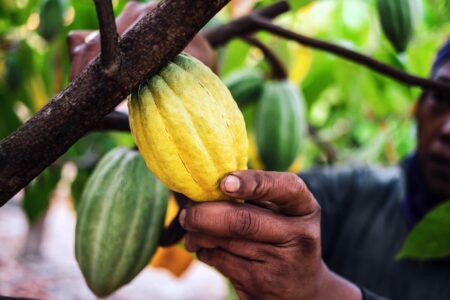ICCO forecasts 11% cut in cocoa production, as Fairtrade urges action on farmer income

The International Cocoa Organisation (ICCO) has revealed its latest quarterly data, as it forecasts a near 11% decline in global production, as key West African nations are hit by poor weather and crop diseases impacting yields, reports Neill Barston.
According to the group’s latest bulletin, it noted that ‘significant declines’ in volume were expected this year, and as Confectionery Production has previously reported, Ghana and Ivory Coast have been especially hit by a combination of factors that has resulted in a concerning deficit of stocks.
This in turn has contributed to inflated costs of cocoa, which the ICCO also noted as another factor influencing the market. Indeed, this month, crop rates reached stock exchange highs in New York of $6,500 a tonne, which has also been attributed to major stock market speculation, in which $8.7 billion has been put into the cocoa market by hedge fund investors over the past few months. This has seen the price of cocoa double in the past year alone.
Underlining the situation, the ICCO said that compared to the 2022/23 season, global cocoa supply is anticipated to decline by almost 11% to 4.449 million tonnes. Global cocoa demand is projected to decrease by almost 5% to 4.779 million tonnes. It also observed other issues that were affecting production, including ageing tree stocks that were returning reduced yields.
As previously reported, there have also been issues with the cost of vital fertilisers increasing over the past two years, as well as other external factors in Ghana and Ivory Coast including the issue of illegal ‘galamsey’ (gather them and sell them) gold mining on farmland, as well as reported incidents of smuggling of cocoa supplies – with prices allegedly being far higher in other neighbouring West African countries.
Moreover, as the ICCO noted, the rapid rise in cocoa prices was likely to affect the operations of processors – which has already been observed in the annual reporting of major companies including Lindt, Mondelez and Hershey.
While prices may have been high on the stock exchange in both New York, at over $6,000 a tonne, as Confectionery Production understands the present situation, actual farmgate contracts offered to farmers in Ghana and Ivory Coast, are presently being offered at a far lower rate of between $1,800 and $2,000 a tonne, meaning that they are still a significant way off achieving a living income from cocoa farming.
Fairtrade concern
The pivotal issue of addressing farmer pay has previously been raised by a number of organisations, including Fairtrade, as covered by Jon Walker, Fairtrade International Senior Advisor for Cocoa, who spoke at our World Confectionery Conference in Brussels, 2022.
Speaking on the present situation, he said: “The global market price of cocoa has more than doubled over the past year and increased by about 40% – $1,000 per tonne – just since the start of 2024.
“While high prices may seem like a windfall for farmers, once they eventually filter through to the farmgate, the underlying causes are worrying. The drastic increase is the result of a drop in supply, triggered by crop loss due to disease, climate change, and likely the increases in the costs of production and living for farmers due to crippling inflation.
“Fairtrade has long maintained that the cycle of boom and bust pricing is unsustainable for smallholder farmers, who need more stability in their livelihoods in order to invest in their farms and adapt to climate change. Higher prices offset by lower productivity simply perpetuates the income insecurity that keeps farmers trapped in poverty and threatens the future of cocoa.
“It remains to be seen if supply will bounce back, or whether the current trend will be longer-lasting. New regulations being rolled out and debated in Europe – such as on deforestation and corporate due diligence – are much needed but will also increase costs for producers as well as companies in unknown ways.”
He added that in order to make progress on environmental and living income goals, stable minimum prices and long-term contracts between buyers and cocoa producers are necessary. As he asserted, this can be achieved through strong partnerships and co-investment to overcome the current price shocks and building more sustainable cocoa livelihoods within the core supply chain serving confectionery markets.



